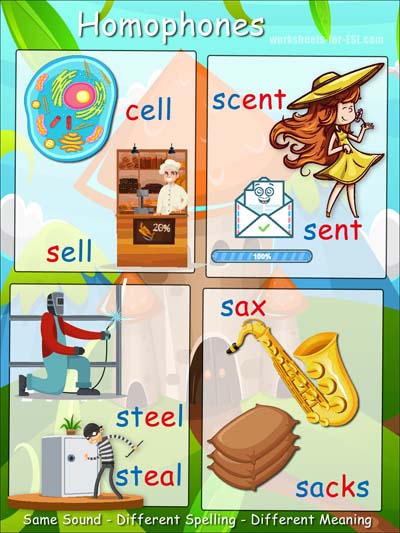Homonyms
Homophone Examples Starting with s

Homonyms are words which have the same spelling OR pronunciation but different meanings. These words celebrate the rich diversity of English word origins, but often cause confusion for people learning English as an additional language.
There are several different types of homonyms. This page will provide examples of the homonym subset ‘homophones’.
‘Homophone’ – from the Latin – ‘homo’ meaning ‘same’ and ‘phone’ meaning ‘sound. So ‘homophone’ are different words with the ‘same sound’.
e.g. ‘cell’ and ‘sell’ have different spellings and different meanings but sound alike.
sent & scent
steal & steel
sax & sacks
Why Do We Learn About Homonyms?
It is generally agreed a thorough understanding of homonyms ensures effective communication so here are a collection of homonym activities to help with the learning.
Possible Homonym Activities:
* Discuss the dual meanings of each homophone.
* Write the meaning of each homophone.
* Write a ‘real life’ sentence for each word —-> a tad boring but effective.
* Compose ‘silly sentences’ for word pairs e.g. ‘Steal the steel!!!’ exclaimed the mobster.
* Create ‘Identifying Questions’ e.g. ‘Which spelling is the musical instrument?’
* Get creative and act out homophones pairs in pairs 😉 as part of spelling mini lessons.
* Create humorous sketches and film them.. Ham it up! The sillier the better 🙂 e.g. eating an eight, making cake with flower etc
* Play Building – create a humorous skit to illustrate a number of homonyms – channel ‘Fun with Flags’ for an interesting twist.
* Add these homonym posters to a display folder to create a class booklet / vocabulary dictionary. Be sure to revisit this resource as part of your revision schedule.
* Create a ‘Tricky Word Wall’ – this is your classroom wall display of homophone posters. NB Classroom displays ‘become invisible’ if not revisited, so be sure to discuss the posters as part of your revision schedule.
* Model Self Talk – I like to model the self talk of day-dreaming to make learning of some concepts a bit of fun and a little irreverent. ‘Where am I ever going to use this stuff? … oh look… steal and steel are homophones… that means… oh… better get back to work now’ 🙂
* Play a cooperative game of Charades with a list of homophones.
* Students draw their own illustrations of the homophones.
* Become ‘Homophone Aware’ – Be on the lookout for incidental teachable moments throughout the day. If a homophone comes up, write it on a growing list. This can be as simple as placing a piece of paper beside these printed out homonym posters.
* Research the etymology of a few homonyms. The difference in sound or spelling usually means the words have originated in different parts of the world or from different points in history. Try using the Etymology Dictionary Online – to discover where and when a word was first used.
* Homonym of the Day – as part of the morning routine discuss a homophone. Throughout the day students try to drop the morning homophone casually into conversation. NB I like to try and ‘reduce’ this to a kind of ‘Dad Joke’ by saying something like… ‘Hey did you see what I did there? I casually dropped the word ______ into the discussion to point out that it is the homonym…. you know… the word we talked about this morning that means both…’. Ham it Up!!! to the point where an audible groan becomes the standard response from the students each time you pull this ‘trick’ out of the bag hehehe
* Participate in some recreational word play. Pick 10 to 15 homophones and write a poem or short story. Perform the piece for a younger grade.
* Write a short article for the school newsletter about studying homophones. Include some of the work samples from above and include the link to this homophone posters website. Encourage parents to print out a few posters to be displayed on the fridge or back of the toilet door.
Where to Next:
How about some Double Letter Word Posters or a FREE Sight Word Game




